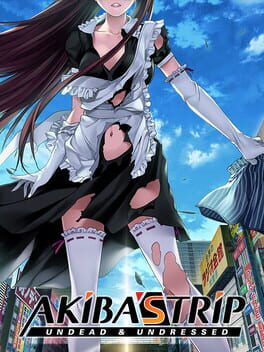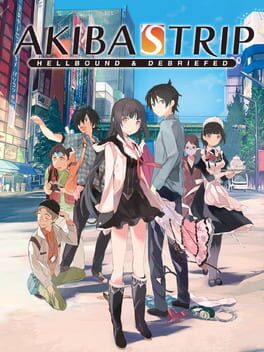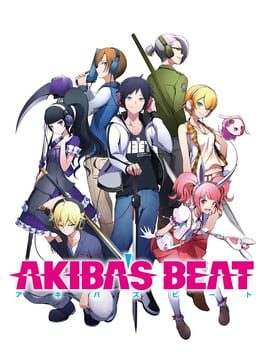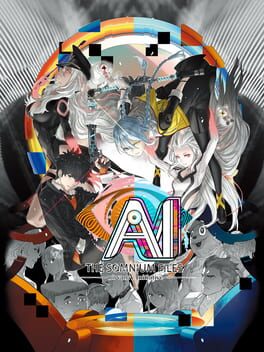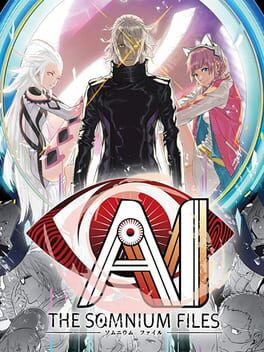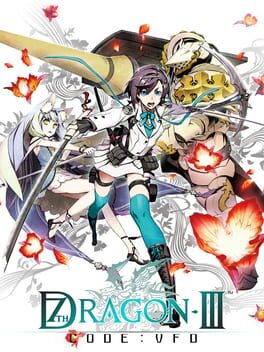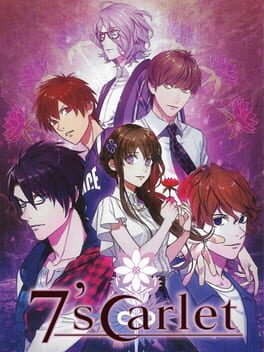Geekarm
First things first, since I played this game in its original vita release form, I definitely experienced some performance issues while playing that were fixed by the PS4 port. Since these have been updated by my understanding I won't raise them, but I want to note their existence on vita.
With that being said, my opinion on U&U is a little strange. I really disliked the monotony of the gameplay and the artificial difficulty, and none of the side quests were particularly interesting. The pacing of the narrative is super weird, going from nothing happening in the first 10 or so chapters to more or less everything at once. Shion's route is an inconsistent mess that uses one of my most hated tropes of all time.
And yet I'm still really fond of U&U! The other main girls are all really interesting and awesome, the main antagonist owns every minute of screentime they get (which admittedly is not many, though Director's Cut may fix this) and the lore has a lot going for it too. Nana's subplot is straight up adorable if you go all the way with it, the replay value is neat... in general U&U just feels like a very weirdly cosy game. Also, yay for equal fanservice between the men and women!
However, with Director's Cut existing... I really can't recommend the vanilla PS3/vita releases anymore. Even without playing DC just yet the devs pretty much admitted these versions were unfinished without the "true ending not told ten years ago", so really I'd say just go straight to DC rather than the original game, there's nothing in them that isn't also in DC aside from maybe slightly better lighting.
With that being said, my opinion on U&U is a little strange. I really disliked the monotony of the gameplay and the artificial difficulty, and none of the side quests were particularly interesting. The pacing of the narrative is super weird, going from nothing happening in the first 10 or so chapters to more or less everything at once. Shion's route is an inconsistent mess that uses one of my most hated tropes of all time.
And yet I'm still really fond of U&U! The other main girls are all really interesting and awesome, the main antagonist owns every minute of screentime they get (which admittedly is not many, though Director's Cut may fix this) and the lore has a lot going for it too. Nana's subplot is straight up adorable if you go all the way with it, the replay value is neat... in general U&U just feels like a very weirdly cosy game. Also, yay for equal fanservice between the men and women!
However, with Director's Cut existing... I really can't recommend the vanilla PS3/vita releases anymore. Even without playing DC just yet the devs pretty much admitted these versions were unfinished without the "true ending not told ten years ago", so really I'd say just go straight to DC rather than the original game, there's nothing in them that isn't also in DC aside from maybe slightly better lighting.
I played Akiba's Trip H&D pretty much immediately after its... successor AND predecessor (yay localisation issues), Trip U&U, and I'm unpopular in saying I prefer this entry. However, I just can't deny how great the plot and characterisation of H&D is! The narrative is mostly light even with its tackling of some mature themes, with a faction war at the centre of both the story and the branching endings. This setup allowed for some good old themes of coexistence and acceptance, and boy does H&D get it right. The characters are all absolute treasures (even the villains and random NPCs!) and I found myself incredibly attached to everyone by the end. This is definitely aided by tanu's amazing sprite work throughout the story's cutscenes.
The gameplay is generally serviceable and nothing more, however I actually prefer the system for obtaining clothes here to U&U and the option to buy different move types was a godsend. How U&U didn't have moving or area attacks is beyond me. The graphics are also mostly serviceable, but to be totally honest after seeing what they were in the original PSP release they're a definite upgrade, jesus. Audio quality can be a little strange on VA in the early game, but due to H&D's production coinciding with covid lockdowns this isn't something I hold against the game at all.
Given the whole concept of H&D involves you learning stripping techniques from a shady dancing woman who lives in a pink mansion on an Akiba rooftop, it would be easy to assume it's mostly fanservice and not much plot (not that fanservice is a bad thing per se). But not only is fanservice a minimum, this story is one of the most welcome experiences I've chanced upon in a game.
The gameplay is generally serviceable and nothing more, however I actually prefer the system for obtaining clothes here to U&U and the option to buy different move types was a godsend. How U&U didn't have moving or area attacks is beyond me. The graphics are also mostly serviceable, but to be totally honest after seeing what they were in the original PSP release they're a definite upgrade, jesus. Audio quality can be a little strange on VA in the early game, but due to H&D's production coinciding with covid lockdowns this isn't something I hold against the game at all.
Given the whole concept of H&D involves you learning stripping techniques from a shady dancing woman who lives in a pink mansion on an Akiba rooftop, it would be easy to assume it's mostly fanservice and not much plot (not that fanservice is a bad thing per se). But not only is fanservice a minimum, this story is one of the most welcome experiences I've chanced upon in a game.
2016
This will be the only game I ever give a star rating to, purely because of what it means to me. I'm honestly not gonna rant on Akiba's Beat too long, since I'd be here forever and I know it would turn into gushing, but I do still feel my judgement is valid having played the game several times and watching a relative play through another recently.
The main point I want to state with this review is that this game is NOT soulless, and I still can't understand where this reputation emerged from. Everything from the dialogue to the item descriptions to the narrative to the voice acting... this game is absolutely a work of passion. I definitely respect that the story isn't for everyone, but the love that was poured into this game both by the original team and the western localisation team shines through no matter what. Regardless of anything else, I'd absolutely recommend Beat on heart alone, with its somewhat satirical yet genuine core narrative about escapism and isolation. I've talked with a couple of people who worked on the game, and the one apparent thing every time is how much passion they put into it.
With that out of the way, all I can really say is this game was pivotal to me in more ways than I can describe. Its characters and themes were and still are a huge comfort to me, and the core theme of moving into the future while carrying memories of the past has helped me time and time again. It lets you know that it's okay to fantasise and escape every now and again, since it's those daydreams that motivate us to catch our goals in reality, and that's always been really powerful imo. To quit my emotional stuff for a moment, the plot straight up bangs and the characters are brilliant. Regardless of if you find them predictable or not, there's some really cool and compelling concepts in here that are grounded well by the setting and characters.
Beat definitely shows some indie roughness in a few QoL aspects but nothing will ever stop me from loving it, even now I find new reasons to appreciate it. It just saddens me that people could call it heartless.
To make one last comment: As someone who has played the first portion of Persona 5, they are nothing alike. This isn't to do with quality or my opinion, just objectively, the story themes are completely unrelated, the gameplay isn't the same genre, even the structure of the narrative is completely different. I can confidently say that people who compared this game to P5 did so because of the similar release dates and/or not playing enough games with mindscapes for environments. I have the same things to say about P4 too. A much more apt comparison would be Tokyo Xanadu eX+, another game I greatly enjoyed, and I can confidently say that if you enjoy one then it's highly likely you'll also enjoy the other.
The main point I want to state with this review is that this game is NOT soulless, and I still can't understand where this reputation emerged from. Everything from the dialogue to the item descriptions to the narrative to the voice acting... this game is absolutely a work of passion. I definitely respect that the story isn't for everyone, but the love that was poured into this game both by the original team and the western localisation team shines through no matter what. Regardless of anything else, I'd absolutely recommend Beat on heart alone, with its somewhat satirical yet genuine core narrative about escapism and isolation. I've talked with a couple of people who worked on the game, and the one apparent thing every time is how much passion they put into it.
With that out of the way, all I can really say is this game was pivotal to me in more ways than I can describe. Its characters and themes were and still are a huge comfort to me, and the core theme of moving into the future while carrying memories of the past has helped me time and time again. It lets you know that it's okay to fantasise and escape every now and again, since it's those daydreams that motivate us to catch our goals in reality, and that's always been really powerful imo. To quit my emotional stuff for a moment, the plot straight up bangs and the characters are brilliant. Regardless of if you find them predictable or not, there's some really cool and compelling concepts in here that are grounded well by the setting and characters.
Beat definitely shows some indie roughness in a few QoL aspects but nothing will ever stop me from loving it, even now I find new reasons to appreciate it. It just saddens me that people could call it heartless.
To make one last comment: As someone who has played the first portion of Persona 5, they are nothing alike. This isn't to do with quality or my opinion, just objectively, the story themes are completely unrelated, the gameplay isn't the same genre, even the structure of the narrative is completely different. I can confidently say that people who compared this game to P5 did so because of the similar release dates and/or not playing enough games with mindscapes for environments. I have the same things to say about P4 too. A much more apt comparison would be Tokyo Xanadu eX+, another game I greatly enjoyed, and I can confidently say that if you enjoy one then it's highly likely you'll also enjoy the other.
I wish I could give AINI the same praise I gave to AITSF. On one end the performance issues on switch were fixed and the QTEs were given an accessible easy mode, and the animated sequences look much more impressive thanks to utilising mocap. I'd even say as well that this could've been a genuinely solid story... as its own thing.
As an AITSF sequel, however, it falls apart for me. The plot of AINI for me demanded less investment of the characters over Uchikoshi's newest "mindbending meta twist", which is the complete opposite of the first game where the plot was simpler in favour of the character dynamics and theme of family. It especially clashes when the character endings feel borderline unnecessary this time, not really providing the characters any resolution not already depicted in the main story with one exception. The somniums also feel much more like narrative vehicles than surreal weirdness, which on its own isn't so bad, but the subsequent railroading and genre shift to more conventional puzzles was a little underwhelming.
The two greatest offenders for me ended up being AINI's main twist, and its treatment of one specific character. The twist does absolutely nothing for the characters and basically serves to make the experience more frustrating for the player - it interests me in concept, and maybe trying it outside the AI series could've worked, but the execution just ultimately pissed me off with how pointless it was. It also requires multiple convoluted events to happen and a full retcon of a major plot point from AITSF, not to mention the complete ignorance of specific characters and dynamics in order to preserve it. The mystery is great without it as well! Meanwhile, the character I mentioned started as deeply interesting, only for their endgame role to completely destroy any pre-established nuance to their personality. I would've preferred if they had LESS depth if it meant this role was less unsatisfying.
I really don't want to just ramble on with misery, though, because AINI still has multiple shining lights that kept me playing the whole way. Ryuki is my favourite character in the entirety of the AI series, he's incredibly entertaining while also being a genuinely interesting and serious character, and his dynamic with Tama is a joy to witness. I also found new additions such as the crime scene recreation really enjoyable despite their simplicity, especially since they're the source of some of AINI's funniest scenes. Despite my criticism of the somniums most were still enjoyable, and some of the more unique gimmicks stuck with me! Also the soundtrack banged as always.
But yeah, I'd honestly still recommend AINI, but... in my opinion if you've played AITSF, don't play it like it's a sequel, play it as its own thing. That way you'll go through less disappointment at worst, and maybe find extra enjoyment from the game at best too if you end up loving what I wasn't able to.
As an AITSF sequel, however, it falls apart for me. The plot of AINI for me demanded less investment of the characters over Uchikoshi's newest "mindbending meta twist", which is the complete opposite of the first game where the plot was simpler in favour of the character dynamics and theme of family. It especially clashes when the character endings feel borderline unnecessary this time, not really providing the characters any resolution not already depicted in the main story with one exception. The somniums also feel much more like narrative vehicles than surreal weirdness, which on its own isn't so bad, but the subsequent railroading and genre shift to more conventional puzzles was a little underwhelming.
The two greatest offenders for me ended up being AINI's main twist, and its treatment of one specific character. The twist does absolutely nothing for the characters and basically serves to make the experience more frustrating for the player - it interests me in concept, and maybe trying it outside the AI series could've worked, but the execution just ultimately pissed me off with how pointless it was. It also requires multiple convoluted events to happen and a full retcon of a major plot point from AITSF, not to mention the complete ignorance of specific characters and dynamics in order to preserve it. The mystery is great without it as well! Meanwhile, the character I mentioned started as deeply interesting, only for their endgame role to completely destroy any pre-established nuance to their personality. I would've preferred if they had LESS depth if it meant this role was less unsatisfying.
I really don't want to just ramble on with misery, though, because AINI still has multiple shining lights that kept me playing the whole way. Ryuki is my favourite character in the entirety of the AI series, he's incredibly entertaining while also being a genuinely interesting and serious character, and his dynamic with Tama is a joy to witness. I also found new additions such as the crime scene recreation really enjoyable despite their simplicity, especially since they're the source of some of AINI's funniest scenes. Despite my criticism of the somniums most were still enjoyable, and some of the more unique gimmicks stuck with me! Also the soundtrack banged as always.
But yeah, I'd honestly still recommend AINI, but... in my opinion if you've played AITSF, don't play it like it's a sequel, play it as its own thing. That way you'll go through less disappointment at worst, and maybe find extra enjoyment from the game at best too if you end up loving what I wasn't able to.
First thing I wanna note with AITSF is that I played the switch version. This is quite possibly the only switch port I've played to date that is genuinely bad (instead of just the usual "portable console has compression" complaints I've often seen). Area and new day transitions grind the frame rate to a halt, and both Aiba's AI sight images and flashback scenes in dialogue take several seconds to load at almost every occurrence beyond midgame. This is tolerable up until endgame where there's... a LOT of flashbacks and AI sight usage to recite the entire case and half of its backstory, which unfortunately did lead to some frustration as I was playing.
That being said... AITSF is still a great game, and I really enjoyed my time with it! I wasn't big on the QTEs, I felt the porn jokes got a bit repetitive (I'm fine with them, some are genuinely funny, but the same ones get used a little too much imo) and I definitely started with the wrong ending for good narrative progression, but it didn't prevent this from being a blast. The somniums are weird and wonderful, the characters shine through with their absurdist yet endearing attitudes, and the mystery itself was as grisly as it was compelling! I thought a couple of plot points could've used more exploration but it didn't have a significant impact on my enjoyment or anything. Soundtrack is also a hell of a banger, really nails the atmosphere every time. I also wanna mention that despite sharing certain staples, AITSF moves away from some of Kotaro Uchikoshi's commonly known tropes, which I personally liked as it freed up the narrative for him to test some new ideas (and even make a lighthearted parody of his old ones!)
So yeah, love this game, and tbh I'd say if the switch is your only option, it's still playable and most content runs fine, especially the somniums which are the most important due to time sensitive navigation. Just... if you have any other console or a PC that can run it, please play it on literally anything else.
That being said... AITSF is still a great game, and I really enjoyed my time with it! I wasn't big on the QTEs, I felt the porn jokes got a bit repetitive (I'm fine with them, some are genuinely funny, but the same ones get used a little too much imo) and I definitely started with the wrong ending for good narrative progression, but it didn't prevent this from being a blast. The somniums are weird and wonderful, the characters shine through with their absurdist yet endearing attitudes, and the mystery itself was as grisly as it was compelling! I thought a couple of plot points could've used more exploration but it didn't have a significant impact on my enjoyment or anything. Soundtrack is also a hell of a banger, really nails the atmosphere every time. I also wanna mention that despite sharing certain staples, AITSF moves away from some of Kotaro Uchikoshi's commonly known tropes, which I personally liked as it freed up the narrative for him to test some new ideas (and even make a lighthearted parody of his old ones!)
So yeah, love this game, and tbh I'd say if the switch is your only option, it's still playable and most content runs fine, especially the somniums which are the most important due to time sensitive navigation. Just... if you have any other console or a PC that can run it, please play it on literally anything else.
When I first played 7th Dragon III, I remember frequently calling it the one game I considered to be a masterpiece. Granted I was around 16 at the time, but I gotta be honest, it's still bloody brilliant in my eyes! You do need a preference for grand-scale plots with insane twists to get the most out of 7thD3, but it commits to them in dramatic fashion and I love it for that.
I also want to note that I have never played the previous entries, so my view isn't affected positively or negatively by them. In my experience I feel one mid-late game plot point might lose some impact if you don't read about a certain pair of recurring characters, but as a completely blind player I still found it emotional. Other than this you can more or less play it on its own.
I played on casual at the time, but would definitely like to retry on normal someday. The combat isn't too tricky on this difficulty, but I liked the sheer volume of strategies available once you obtain more classes, and I liked messing around with a few unconventional ones (my duelist judgement strat... so goofy yet so weirdly fun to pull off lmao). If there's anything I didn't like it was that there's one boss whose sole gimmick is a party-wide instakill chance skill, which was frustrating instead of challenging/fun, but I learned later it can be negated by double-stacking instakill items. Inconvenient, but at least there's a way around it!
Art and soundtrack go hard but this is Shirow Miwa and Yuzo Koshiro we're talking about so it's not surprising, just hella neat. The inserts arranged by sasakure.uk are epic too. In general 7thD3 is just an awesome hidden gem.
I also want to note that I have never played the previous entries, so my view isn't affected positively or negatively by them. In my experience I feel one mid-late game plot point might lose some impact if you don't read about a certain pair of recurring characters, but as a completely blind player I still found it emotional. Other than this you can more or less play it on its own.
I played on casual at the time, but would definitely like to retry on normal someday. The combat isn't too tricky on this difficulty, but I liked the sheer volume of strategies available once you obtain more classes, and I liked messing around with a few unconventional ones (my duelist judgement strat... so goofy yet so weirdly fun to pull off lmao). If there's anything I didn't like it was that there's one boss whose sole gimmick is a party-wide instakill chance skill, which was frustrating instead of challenging/fun, but I learned later it can be negated by double-stacking instakill items. Inconvenient, but at least there's a way around it!
Art and soundtrack go hard but this is Shirow Miwa and Yuzo Koshiro we're talking about so it's not surprising, just hella neat. The inserts arranged by sasakure.uk are epic too. In general 7thD3 is just an awesome hidden gem.
2016
Do not play 7'scarlet if you wanna chill and leave the experience feeling happy and fuzzy inside. I heard it was "sad" and thought "eh can't be that bad", and then one route left me a drained shell of a woman for the rest of the day.
I utterly love it for that. 7S gradually introduces its themes in a convincing manner as you progress through the routes, then once it's sunken in turns them against the player in the most tragic yet brilliant way, all aided by the visual atmosphere and compelling character work. The story drags a little initially in my opinion, but it's absolutely worth sticking with it the whole way if you're up for a heaping of bittersweetness. I also found the volume of insert songs on offer to be a nice bonus!
Since this is an otome I'll end off with my fave guy... though honestly I'll cheat a bit here as with 7S. My fave overall is Sosuke, but Yuzuki had my favourite romantic dynamic with Ichiko and Toa was just too great to not also shout out! Hino and Isora were also great, their routes just suffer a little from being the early ones, and the secret LI put me off with one line despite some unexpectedly solid setup. But yeah, this is absolutely one of my fave otome I've played to date.
I utterly love it for that. 7S gradually introduces its themes in a convincing manner as you progress through the routes, then once it's sunken in turns them against the player in the most tragic yet brilliant way, all aided by the visual atmosphere and compelling character work. The story drags a little initially in my opinion, but it's absolutely worth sticking with it the whole way if you're up for a heaping of bittersweetness. I also found the volume of insert songs on offer to be a nice bonus!
Since this is an otome I'll end off with my fave guy... though honestly I'll cheat a bit here as with 7S. My fave overall is Sosuke, but Yuzuki had my favourite romantic dynamic with Ichiko and Toa was just too great to not also shout out! Hino and Isora were also great, their routes just suffer a little from being the early ones, and the secret LI put me off with one line despite some unexpectedly solid setup. But yeah, this is absolutely one of my fave otome I've played to date.
